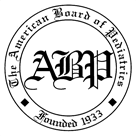American Board of Pediatrics

Pediatrics
Pediatricians care for children from birth to early adulthood, providing preventive care, acute and chronic disease care in children, and more.
Pediatricians practice the specialty of medical science concerned with the physical, emotional, and social health of children from birth to young adulthood. Pediatric care encompasses a broad spectrum of health services ranging from preventive health care to the diagnosis and treatment of acute and chronic diseases. Pediatricians understand the many factors that affect the growth and development of children. They understand that children are not simply small adults. Children change rapidly, and they must be approached with an appreciation for their stage of physical and mental development.
Subspecialties
Adolescent Medicine
A pediatrician who specializes in Adolescent Medicine is a multidisciplinary health care specialist trained in the unique physical, psychological, and social characteristics of adolescents, their health care problems and needs.
Child Abuse Pediatrics
A pediatrician who specializes in Child Abuse Pediatrics serves as a resource to children, families, and communities by accurately diagnosing abuse; consulting with community agencies on child safety; providing expertise in courts of law; treating consequences of abuse and neglect; directing child abuse and neglect prevention programs; and participating on multidisciplinary teams investigating and managing child abuse cases.
Developmental-Behavioral Pediatrics
A pediatrician who specializes in Developmental-Behavioral Pediatrics possesses special skills, training, and experience to foster understanding and promotion of optimal development of children and families through research, education, clinical care, and advocacy efforts. This physician assists in the prevention, diagnosis, and management of developmental difficulties and problematic behaviors in children and in the family dysfunctions that compromise children’s development.
Hospice and Palliative Medicine
A pediatrician who specializes in Hospice and Palliative Medicine provides care to prevent and relieve the suffering experienced by patients with life-limiting illnesses. This specialist works with an interdisciplinary hospice or palliative care team to optimize quality of life while addressing the physical, psychological, social, and spiritual needs of both patient and family.
Medical Toxicology
Medical toxicologists are physicians who specialize in the prevention, evaluation, treatment, and monitoring of injury and illness from exposures to drugs and chemicals, as well as biological and radiological agents. These specialists care for people in clinical, academic, governmental, and public health settings, and provide poison control center leadership. Important areas of Medical Toxicology include acute drug poisoning; adverse drug events; drug abuse, addiction and withdrawal; chemicals and hazardous materials; terrorism preparedness; venomous bites and stings; and environmental and workplace exposures.
Neonatal-Perinatal Medicine
A pediatrician specializing in Neonatal-Perinatal Medicine acts as the principal care provider for sick newborn infants. This specialist’s clinical expertise is used for direct patient care and for consulting with obstetrical colleagues to plan for the care of mothers who have high-risk pregnancies.
Pediatric Cardiology
A pediatric cardiologist provides comprehensive care to patients with cardiovascular problems. This specialist is skilled in selecting, performing, and evaluating the structural and functional assessment of the heart and blood vessels, and the clinical evaluation of cardiovascular disease.
Pediatric Critical Care Medicine
A pediatrician who specializes in Pediatric Critical Care Medicine is expert in advanced life support for children from the term or near-term neonate to the adolescent. This competence extends to the critical care management of life-threatening organ system failure from any cause in both medical and surgical patients, and to the support of vital physiological functions. This specialist may have administrative responsibilities for intensive care units and also facilitates patient care among other specialists.
Pediatric Emergency Medicine
A pediatrician specializing in Pediatric Emergency Medicine has special qualifications to manage emergency treatments in acutely ill or injured infants and children.
Pediatric Endocrinology
A pediatrician with specialization in Pediatric Endocrinology provides expert care to infants, children and adolescents who have diseases that result from an abnormality in the endocrine glands (glands which secrete hormones). These diseases include diabetes mellitus, growth failure, unusual size for age, early or late pubertal development, birth defects, the genital region, and disorders of the thyroid and the adrenal and pituitary glands.
Pediatric Gastroenterology
A pediatrician specializing in Pediatric Gastroenterology specializes in the diagnosis and treatment of diseases of the digestive systems of infants, children, and adolescents. The pediatric gastroenterologist treats conditions such as abdominal pain, ulcers, diarrhea, cancer, and jaundice and performs complex diagnostic and therapeutic procedures using lighted scopes to see internal organs.
Pediatric Hematology-Oncology
A pediatrician who specializes in Pediatric Hematology-Oncology is trained in the combination of pediatrics, hematology, and oncology to recognize and manage pediatric blood disorders and cancerous diseases.
Pediatric Hospital Medicine
A pediatrician who specializes in Pediatric Hospital Medicine has expertise in the care of children with a variety of illnesses and medical needs that require hospital care. Pediatric hospitalists provide leadership in the care of pediatric patients throughout the hospital including the pediatric ward, labor and delivery, the newborn nursery, the emergency department, the neonatal intensive care unit, and the pediatric intensive care unit.
Pediatric Infectious Diseases
A pediatrician who specializes in Pediatric Infectious Diseases cares for children through the diagnosis, treatment, and prevention of infectious diseases. This specialist can apply specific knowledge to affect a better outcome for pediatric infections with complicated courses, underlying diseases that predispose to unusual or severe infections, unclear diagnoses, uncommon diseases, and complex or investigational treatments.
Pediatric Nephrology
A pediatrician with special expertise in Pediatric Nephrology deals with the normal and abnormal development and maturation of the kidney and urinary tract; the mechanisms by which the kidney can be damaged; the evaluation and treatment of renal diseases; fluid and electrolyte abnormalities; hypertension; and renal replacement therapy.
Pediatric Pulmonology
A pediatrician specializing in Pediatric Pulmonology is dedicated to the prevention and treatment of all respiratory diseases affecting infants, children, and young adults. This specialist is knowledgeable about the growth and development of the lung, assessment of respiratory function in infants and children, and experienced in a variety of invasive and noninvasive diagnostic techniques.
Pediatric Rheumatology
A pediatrician who specializes in Pediatric Rheumatology treats diseases of joints, muscle, bones, and tendons. A pediatric rheumatologist diagnoses and treats arthritis, back pain, muscle strains, common athletic injuries, and collagen diseases.
Pediatric Transplant Hepatology
The pediatrician who specializes in Transplant Hepatology possesses the special knowledge, skill and expertise required of pediatric gastroenterologists to care for patients prior to and following hepatic transplantation. Selection of appropriate recipients requires assessment by a team having experience in evaluating the severity and prognosis of patients with liver disease.
Sleep Medicine
A pediatrician with demonstrated expertise in the diagnosis and management of clinical conditions that occur during sleep, that disturb sleep, or that are affected by disturbances in the wake-sleep cycle. This specialist is skilled in the analysis and interpretation of comprehensive polysomnography, and well-versed in emerging research and management of a sleep laboratory.
Sports Medicine
A pediatrician who specializes in preventing, diagnosing, and treating injuries related to participating in sports and/or exercise. In addition to the study of those fields that focus on prevention, diagnosis, treatment, and management of injuries, sports medicine also deals with illnesses and diseases that might have effects on health and physical performance.

